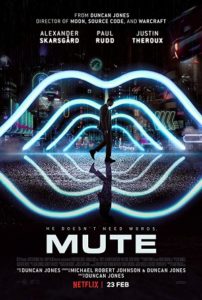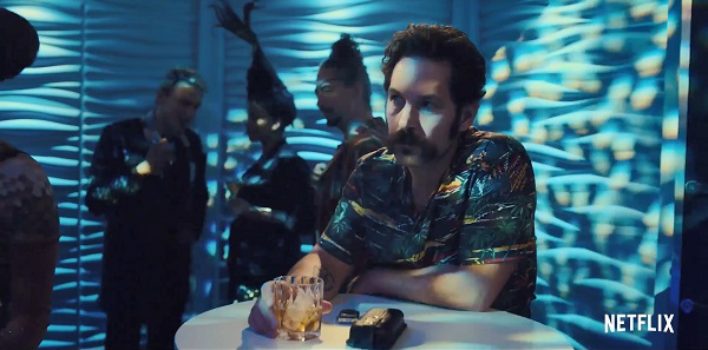Review| Mute
 “What is Mute? I’ve never heard of it.” You may be saying to yourself. Well, dear friend, in 2009 a small sci-fi film called Moon was released. Directed by up-and-coming director Duncan Jones (also did Source Code) and staring everyone’s favorite “hey, it’s that guy” actor Sam Rockwell, it has a relatively small cultural footprint. I saw it early on during my freshman year of college and was struck by the film’s poignant depiction of loneliness and alienation. So, when I heard Duncan Jones was finally getting around to making the quasi-sequel Mute that he’d wanted to make for years, I got pretty excited. When given the opportunity to review an upcoming film I jumped at the chance to review the sequel to one of my favorite little-known films. At this point I regret to inform you that… well… the movie is pretty bad.
“What is Mute? I’ve never heard of it.” You may be saying to yourself. Well, dear friend, in 2009 a small sci-fi film called Moon was released. Directed by up-and-coming director Duncan Jones (also did Source Code) and staring everyone’s favorite “hey, it’s that guy” actor Sam Rockwell, it has a relatively small cultural footprint. I saw it early on during my freshman year of college and was struck by the film’s poignant depiction of loneliness and alienation. So, when I heard Duncan Jones was finally getting around to making the quasi-sequel Mute that he’d wanted to make for years, I got pretty excited. When given the opportunity to review an upcoming film I jumped at the chance to review the sequel to one of my favorite little-known films. At this point I regret to inform you that… well… the movie is pretty bad.
Mute is set in a futuristic, dystopian Berlin and the film follows an Amish bartender, named Leo, (Alexander Skarsgard) who can’t speak due to a boating accident when he was a child. One day his girlfriend goes missing and he embarks on a quest to find her. Meanwhile, two American surgeons (Paul Rudd and Justin Theroux) are also in the movie and may be more linked to Leo’s search than they initially seem. Now, that may sound like a hodge-podge of elements that seem pretty disconnected but, could potentially be cleverly woven together to tell an interesting story, however, that is not the case here. The film starts off decently, but loses focus about 20 minutes in, resulting in a middle hour that feeling like a rambling mass of generic scenes taken from better detective and mafia films. The ending is more focused, but mostly feels contrived by that point.
 Although Mute is currently sitting at the Rotten Tomatoes score of 9%, I will say it’s not that bad. It’s like a 4/10, bad, but not abysmal. There are a few elements that did pique my interest at least momentarily. Leo is a man pretty well alienated from the people around him. He is referred to as a “freak” several times and much of the technology he encounters requires voice activation. His background as an Amish person opens the door to other questions about the place of disability in society and what “healing” should look like. Is it eliminating the disability or adaptation to it? Leo manages to track his lady-friend down all without needing to speak a word, yet most of the characters he interacts with deride him for his inability to speak. For that matter, is Leo disabled because he can’t speak or is society isolating him because they did not develop technology that makes life accessible for him?
Although Mute is currently sitting at the Rotten Tomatoes score of 9%, I will say it’s not that bad. It’s like a 4/10, bad, but not abysmal. There are a few elements that did pique my interest at least momentarily. Leo is a man pretty well alienated from the people around him. He is referred to as a “freak” several times and much of the technology he encounters requires voice activation. His background as an Amish person opens the door to other questions about the place of disability in society and what “healing” should look like. Is it eliminating the disability or adaptation to it? Leo manages to track his lady-friend down all without needing to speak a word, yet most of the characters he interacts with deride him for his inability to speak. For that matter, is Leo disabled because he can’t speak or is society isolating him because they did not develop technology that makes life accessible for him?
 Mute feels like a movie that holds a lot of meaning for Duncan Jones, but that meaning doesn’t translate to everyone else. You can see little bits of clever thought buried within, but, ultimately the film fails to coalesce into anything meaningful. The idea of a mute character in a futuristic setting surrounded by advertisements and noise is a great concept. You can almost hear the social commentary now. That’s what was so frustrating to me, it’s not lazy, just very misguided. Regardless, if you’re at all curious, check out Moon. It’s great, not for kids though.
Mute feels like a movie that holds a lot of meaning for Duncan Jones, but that meaning doesn’t translate to everyone else. You can see little bits of clever thought buried within, but, ultimately the film fails to coalesce into anything meaningful. The idea of a mute character in a futuristic setting surrounded by advertisements and noise is a great concept. You can almost hear the social commentary now. That’s what was so frustrating to me, it’s not lazy, just very misguided. Regardless, if you’re at all curious, check out Moon. It’s great, not for kids though.







